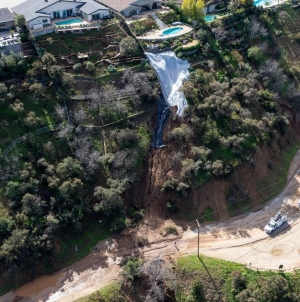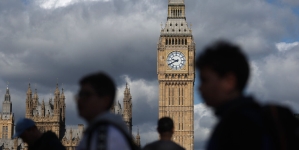-
Coming of Age During the War in Ukraine - October 24, 2023
-
A portion of Mulholland Drive, damaged by mudslides in winter storms, reopens - May 26, 2024
-
‘Maybe You Don’t Want to Win’ - May 26, 2024
-
Donald Trump Putting Law Enforcement in Danger: Attorney - May 25, 2024
-
Avoid the waters of these 5 L.A. County beaches this holiday weekend, public health officials say - May 25, 2024
-
Bawdy Comedy ‘Anora’ Wins Palme d’Or at Cannes Film Festival - May 25, 2024
-
Map Shows Heat Wave Zone Spread Into Five New States - May 25, 2024
-
Azusa police arrest suspected slingshot-wielding vandal - May 25, 2024
-
Donald Trump Hammers Judge Ahead of Jury Instructions - May 25, 2024
-
Sometimes U.S. and U.K. Politics Seem in Lock Step. Not This Year. - May 25, 2024
Coming of Age During the War in Ukraine
The years of young adulthood are often associated with opening horizons. Making friends. Having adventures. The first independent steps into work, or study, or love. For many young Ukrainians, though, war with Russia has upended that reality, replacing it with danger and death, depression and dislocation.
In these photographs and interviews, six young people who live in and around the Ukrainian capital, Kyiv, explore the pressure of experiencing young adulthood at a time of conflict. A few have seen and felt the cost of war painfully close. Others say their daily lives are, for the most part, mundane. But all agreed that it has indelibly altered what should be their formative years as adults.
Maryna Bodnar grew up in the southern Ukrainian city of Mariupol. She was, she said, an “untameable girl” — a daredevil who spent her adolescence seeking thrills and adventure. She met Vitalik on a dating site and they fell in love. Two children followed.
Maryna and Vitalik had planned to marry, but only when they were very old. “We didn’t see the need,” she said. “He was a father. I was a mother. We were comfortable.” Their priority was to raise the children, build a home, see the world.
But Vitalik was a soldier. He had joined the armed forces in 2014, when the Russian military annexed Crimea and seized territory in the east. When Russia invaded again in February 2022, Vitalik was deployed to Mariupol. His death there, one month into the fight for the city, shattered the couple’s dreams. It also left Maryna to raise their boys, Matviy, now 3, and 2-year-old Gennady, alone.
She lives with the children in an apartment in Vitalik’s hometown, Chernihiv, around 80 miles northeast of Kyiv. There, the children are close to their grandparents, and she runs a shop selling candles: a bit of light, literally, in her darkness.
Her emotions swing between grief and a faith that one day might offer a brighter future. “I don’t feel strong,” she said. “But I am looking for strength to continue.”
Emilia and Denys met at a birthday party in Kyiv. What blossomed was their first serious relationship, a time filled with excitement and possibility. Then the bombs began to fall, and everything changed.
As Moscow’s troops advanced on Kyiv in the war’s first weeks, millions of Ukrainians fled. Emilia, along with her family, escaped to the Netherlands, with a plan to continue her studies there. As an adult male, though, Denys was prohibited from leaving Ukraine. “I had to leave everything behind,” Emilia said. “My love, my friends.”
The separation proved shattering. Missing Denys, she found that she was unable to throw herself fully into a new life. So four months after she left she returned to Kyiv. Now, she and Denys are building a life together, in her old home. Music and songwriting are a big part of their new lives, filling the spaces around her studies and his work. “I started to enjoy simple things,” she said.
The war’s presence is unrelenting, though, and has forced them to embrace adult responsibilities more quickly than they ever had expected. She admits she was scared to return at first, but she has come to embrace her independence. “A part of my youth and my easiness have been stolen,” she said. “I didn’t have time to process all of it.”
For more than a year, Kateryna Plechystova’s life was defined by an absence.
Ukraine’s Azov Battalion had led the defense of Mariupol, and her husband, Oleh Krisenko, was one of its fighters. In May, in the final act of the battle for the destroyed city, Russian forces besieged the Ukrainian fighters trapped in underground bunkers at the Azovstal steel works. When the siege ended, Oleh and hundreds of others were forced to surrender as prisoners of war.
Their captivity became an international cause. Kateryna campaigned for their release as part of The Association of Azovstal Defenders’ Families. “I came to understand the concept of being a ‘friend in misfortune,’” she said. At the same time, she lived with months of uncertainty, which led to anxiety and depression.
Then one day in May, she received a phone call from the military. Oleh was being released in a prisoner exchange. The next day, he walked back into her life.
She had been afraid she might not recognize him. He arrived on a bus with other prisoners, looking gaunt and scarred by the abuse he had endured in detention. But he was home.
They have tried to go back to their old life. But the challenges — emotional, physical, mental — sometimes make it hard for both of them to know how to react, how to behave, how to live. In the months while her husband was missing, Kateryna’s work as a physical therapist had become a comfort and a lifeline. She leans on it still. “Healing people,” she said, “somehow helps me to heal myself.”
In the years when his dreams still felt possible, Ruslan Kushka set his heart on studying chemistry in the Czech Republic. It was an unusual ambition, but hardly an outlandish one. To make it happen, he had studied hard at school. He had started to learn Czech. When the time came, he had even won a place at a university in Prague.
Accepting that place is now impossible. In the midst of a national emergency, a lost opportunity to study abroad might seem manageable, and hardly one to complain about as men his age are dying by the thousands.
But for Ruslan, the dashed dream was not a mere abstract. It was his own. Now, trapped in the gap between disappointment and duty, he has wrestled with depression as well as confusion and listlessness.
His redrawn path led him last fall to Bucha, outside Kyiv, where this spring he began working at a pharmacy. He started to save money to buy a microscope and worked out at a gym three times a week. “I have to move on,” he said at the time.
Months later, the Czech Republic remained a dream. His struggle for mental health continued. His reflections became bitter. Old men start wars, he said, “but the youth suffer.”
In his teens, Oleksandr Budko read stories about heroic Ukrainian fighters from history. The stories fueled his patriotism and made him want to serve his country in battle. On the first day of Russia’s invasion last year, Oleksandr, known as Teren, joined the military. After initial training and service in the defense of Kyiv, he was assigned to participate in a campaign to reclaim territory in the northeastern region of Kharkiv.
He was living his dream. It all changed in an instant, when a shell landed near him and severed his lower legs. “There were ambiguous emotions,” he said of his initial reaction. “This pain, panic, and fear. And at the same time, misunderstanding how it happened. The brain refuses to believe it.”
Now, after a long period in hospitals and in a rehabilitation center, he is adapting . “I started to think of my situation not as a disability, but as an opportunity,” he said.
He retained his passion for sports, including weight lifting, and in September he represented Ukraine at the Invictus Games. But he is also writing a memoir, which he titled “Story of a Stubborn Man,” and cultivating a growing social media presence. He uses it to promote not only the importance of a positive mental outlook but also reform of the army’s care of wounded soldiers. It is, in many ways, his new mission. “I always had this internal strength in me,” he said. “I am a determined person.”
By definition, war is the worst of times. Even so, some people are drawn to its intensity. Conflict can give their lives a sense of direction. Mykhailo Panchyshyn eagerly sought it out. “I wasn’t happy in my life,” he said. “I couldn’t find a reason to live. I couldn’t find a purpose for my life.”
Five years earlier, he had been riding high, the newly crowned winner of Ukraine’s version of the musical reality show “X Factor.” Fame and fortune beckoned. But the music industry that had built him up soon brought him back to earth. He wanted to be a rock star. The industry viewed him as a pop star. From the outside, it might seem like a small distinction. But to a sensitive artist thrust into the public eye, it was an existential moment. Despondent and distrustful, Mykhailo stopped making music altogether. Days after Russia invaded, he joined the territorial defense. War, bizarrely, seemed like a way forward. And so he leaned into it.
Frustrated by a lack of action, though, he and two friends requested places in the army, and roles closer to the fighting. “Please send us to the front line,” they begged. “To the first line. To the first front line.” The request was granted but service in Bakhmut came at a cost: Under days of heavy shelling, he and his friends sustained severe concussions. They were eventually discharged. But war had already changed Mykhailo, and restored his passion for music.
He had resumed writing lyrics in the trenches. He sang for wounded soldiers in hospitals. He was performing again, raising funds for the military.
“The war has shaped my future,” he said, “and also my understanding and perspective of the future. It was like I was rolling and didn’t know what to do.” He now views his fame, once a burden, as an asset.
“Our generation did not know what to do next or how to live, and the war gave us a powerful impetus,” Mykhailo said. “That’s how our generation went to war and grew up.”
Oleksandra Mykolyshyn contributed reporting.
Produced by Mona Boshnaq.































